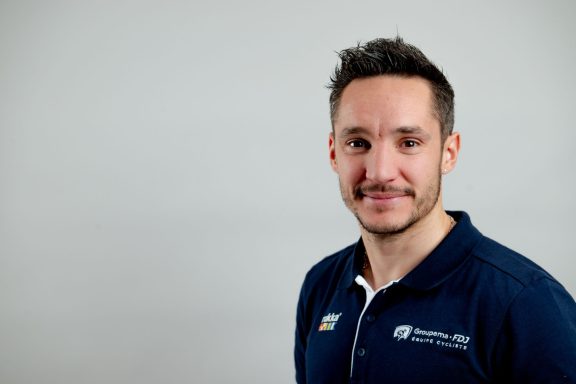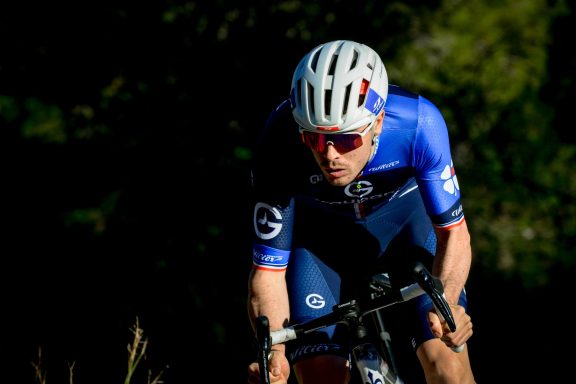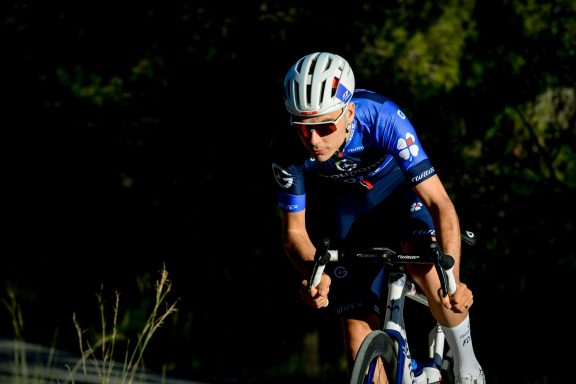Many were waiting for it. Romain Grégoire’s first season at the highest level ultimately ended with five victories and some noteworthy performances against the world’s elite. A month after his last race, the young man from Besançon agreed to look back deeply on his season, with some satisfactions but also with an appetite far from being satisfied.
Romain, your first season in the WorldTour ended just a month ago. What have you done since then?
I took a full month’s rest, and I only got back on the bike on Tuesday. I first spent two weeks without doing any sport at all, then two weeks with a bit of running, easy, with my family. In terms of holidays, it was a bit complicated as people around me weren’t much available, but I still managed to spend five days in Crete. I could switch off completely. I also visited friends in cities here and there. I travelled a bit and took my mind off things. I love cycling and it’s my way of life, so I always think about it a little bit. I also watched some cyclocross races on TV, but not all of them, because I still wanted to disconnect. It feels good, for example, not to go on Strava or on the team platform to upload my training session every day (smiles).
“I don’t take the neo-pro status into consideration”
So let’s look back at your 2023 season. How do you assess it?
I read that Yvon [Madiot] hesitated between giving 6.5 or 7 out of 10 for the team. On a personal level, I would also rate my season in this range. It’s still a successful season because I fulfilled my objectives and especially my number 1 goal which was to win. I even managed to do it five times, including some general classifications, which I did not really imagine at the start of the season. I surprised myself from this point of view, and I am really satisfied and proud of that. I also managed to be at the required level to compete in a Grand Tour at the end of the season, and I did not finish the Vuelta completely dead. On the other hand, I can’t go higher than 7, first because I must allow myself the possibility to do better. I know where I can do better: in the WorldTour. I wasn’t where I hoped I would be, and I would have liked to be more useful to the team at this level. If someone had asked me in January, I wouldn’t have considered winning in the WorldTour this year, but once on the starting line, I definitely wanted to. I haven’t managed to do it yet. One can say that this is actually quite normal, that I am maybe quite hard on myself, but it is also a way to push myself to improve.
Five victories, two general rankings, a top-10 in a WorldTour Classic… As a neo-pro, we could get close to 10 out of 10, couldn’t we?
I don’t take the neo-pro status into consideration. For me, once we’re on the team, we’re there to succeed, no matter if we’ve been there for ten years or six months.
Before your move to the WorldTour, you told us that “everything remained to be done” and that you would “perhaps never win a race among the pros”. How do you look back to your own words after your first season?
This is a difficult question, but I think I still relate to these words. I think it worked out well for me, I managed to pass the stages as I wanted, to improve as I wanted, and therefore to win already this year. Yet, I am aware that it could have turned out differently. Now, that is done. On the other hand, when I said that everything remained to be done, that is still relevant. The more you’re successful, the more you have expectations, and the more difficult it is. Even if I win ten races next year including one in the WorldTour, it will be even harder the following year because I will expect even more. Every year is going to be more and more challenging. For 3-4 years, I have managed to do what I want, but that is only the start.
“There is a clear difference between thinking you can do it and really doing it”
Was it reassuring for you to be able to fight for the top spots quite early on?
It was. The start of the season put me on the right track and immediately made me gain confidence in myself. My first block of racing did me a lot of good, I was up there straight away, on some nice races. I was in the mix on the road, and that also translated into results (5th in the Faun-Ardèche Classic, 6th in the Trofeo Laigueglia, 8th in the Strade Bianche). It proved to me that I wasn’t there for nothing, that I could do it, that I could even win a race. Deep down, I thought that I could do it, but there is a clear difference between thinking you can do it and really doing it. The Strade Bianche remains the great memory of this year. I said that I hadn’t been where I wanted to be at the WorldTour level, but that’s the exception that proves the rule. Apart from my good result, I really liked the race overall. Valentin’s podium, the special atmosphere of the Italian races, the crowd, this splendid finish. That’s a lot of great things in the same weekend and that’s why this race particularly struck me.
A month later, the Ardennes Classics unfortunately came to a premature end for you…
Before that, I competed in my first WorldTour stage race on the Vuelta al Pais Basco. I already took a heavy blow when I saw how high the level was. I realized that it was going really fast all day. I was impressed. I crashed on the second day, and it didn’t help for the next two days. Discovering this level together with the crash made this week tiring. I came out of there thinking: “if this is the WorldTour, I still have a lot of work to do to be able to fight at the front”. A week later, I started the Amstel, but I quickly had to abandon the Ardennes Classics. It was my first goal of the season, not so much in terms of results but especially in terms of physical condition. I was aiming for a peak of shape, but I got sick. I started the Amstel, but I shouldn’t have even tried. Then, I was not able to line up on the Flèche and Liège. For a day or two, it wasn’t easy to accept, but with my coach and the sports directors, we managed to bounce back quite quickly. I remember that I was still at the hotel in Belgium, and we were already seeing how we could adjust the calendar for May and June. I soon had a new guideline, and it helped me prepare for the following weeks.
“The goal in May was to win”
So we get to May, with some great opportunities in France.
It was planned at the start of the season that I would do a few French races in May, and with my early abandon in the Ardennes, I started my rest a week earlier and added the GP du Morbihan and the 4 Jours de Dunkerque, which were not initially planned. In the opposite, what was certain from the very start of the season was that the goal in May was to win. I had a strong start to the season, in races at WorldTour level and so I went down a little notch on this occasion with the clear objective of winning. I came close in Morbihan, I tried in the Tour du Finistère, but it was Paul who took the win, and it finally worked out for me three days later on the 4 Jours de Dunkerque. I had great momentum in these French races.
Did you have and take the time to enjoy this first win?
I obviously enjoyed it, but a stage race being a stage race, you have to ride again the next day, to defend or go after a jersey. You need to get back to it straight after. Moreover, and quite strangely, I would rather pick out the Cassel stage than my victory in the 4 Jours de Dunkerque. In Laon, I won a punchy, uphill sprint. In Cassel, it was a much harder race, where I had to dare and take the risk to go for the pink jersey. I managed to do that. Nothing beats the feeling of putting your hands in the air, but looking back, I think Cassel’s stage was quite nice.
What can you tell us about the French championship, also in Cassel?
I came there with personal ambitions and the team also had a lot of ambition. We managed to do a perfect start, breaking away in a big group with all our best riders. We tackled the championship on the right foot and that put us in a perfect situation. Valentin quickly told us that he was in super shape, and he put on quite a display. As for me, I quickly realized that it was going to be too tough. I miss a few years in the pro peloton to be able to fight at the front in a race like this with 220 kilometres, so much effort, and with the heat. I did what I could, tried to hang on as long as possible and then the tank got empty. But from that day, I only remember Valentin’s performance. Nothing could prevent him from winning that day.
“I wasn’t able to fight for many stages on the Vuelta, and that bothers me a little”
After a break and an altitude camp, your last block of racing before La Vuelta started on the Clásica San Sebastian.
I would have liked to perform well there, and I would like to do so in the future, but I was just coming back from the camp, and I knew it could go either way. It didn’t go right. I did not take this poor performance to heart, and I looked ahead to the Tour du Limousin which was coming up after. The July training camp started to bear fruit there. I was really in great shape, and I also managed to play it tactical thanks to the team which was super strong during these four days. There, we raced the way we like, and I was able to win twice and take the overall. I realize that it is difficult to win within the pros, so I enjoy it whenever it happens to me. The two victories are different, however. I really had my eyes on stage three before the race, but it was a gamble to attack fifteen kilometres from the finish on stage one. It worked out every time, and it was a great week.
Then, there is the Vuelta, where you came second on stage 11. Do you feel that victory was possible that day?
In hindsight, I obviously think that it’s a real shame. But just like I didn’t have regrets after stage 2 (7th), I don’t have any for that day either. I was there in the last 300 meters like I wanted to, and when Herrada accelerated, he was just a lot stronger. He took 20 meters straight away and I couldn’t get back.
What is your balance of this first Grand Tour?
I’m not really satisfied. I probably would have been more satisfied if I had been more active. In the end, there weren’t that many stages for punchers. So I wasn’t able to fight for many stages, and that bothers me a little. To be satisfied with my Grand Tour, I would have needed to be in the breakaway on the hilly stages. Apart from the one where I finished second, I didn’t have the legs to be there. It’s a bit of a shame, but in the future, I would like to improve my physical level to be in these breakaways, like those of Rui Costa or Wout Poels. I may lack some habits in that regard, as taking a breakaway is something I had never done, but on the few stages I was talking about, it clearly came down to the legs. There are no tactical excuses for that.
“To be a leader isn’t something you ask for”
Yet, you have been up there and consistent throughout the year. How do you explain it?
I think the program was smartly built, and by December, I knew almost everything about my season. I was always able to know where I was going and what I was preparing for. We are also starting to get to know each other really well with my coach, Maxime Latourte, and we have adjusted my shape well depending on the schedule. All the work done by the staff meant that I was able to be competitive all year round, and I hope it will be like that every year. Having a long-term plan also allowed me not to be frustrated in the times without competition. I don’t mind spending time training, and I manage to be competitive quite fast when I race again. I think that by doing a Grand Tour and the Tour de Suisse, I saw quite different things, but there was also a performance goal in every race I participated in. This is also the reason for this calendar.
How have you seen your profile as a rider develop this year?
My most natural qualities are those of a puncher. This is where I am strongest and where I need to work to win races. This is clearly my specialty, and we know that nowadays, you need to have a very strong quality if you want to win races. On the other hand, I’m really going to have to take a step forward in the mountains, at least to be able to perform in punchy finishes that come after days including long climbs. This will be the work for the coming months.
Did you get comfortable quickly with being a protected rider within the team?
For sure, it is special to have older, experienced riders riding for you. That being said, to be a leader isn’t something you ask for, but something that comes naturally with results and performance. From the moment I was a leader, if the reason why was clear and that I was more importantly able to meet expectations, I could only get on well with it. In the end, it’s also the role that I enjoy the most, the position that I want. In the team, the guys know why they work, and they are also there to share a comforting word or some advice when it’s needed.
“To have new responsibilities, that’s all I ask for”
Do you feel that your responsibilities, like those of your young teammates, will increase further next year?
Maybe we didn’t think it was going to happen so soon, but it’s a good thing. It motivates us every day in training to know that we have to be at the required level. The team trusts us, gives us confidence and we will do everything to be ready. If you ask me today, at the beginning of November, I’m not ready, but I hope I will be in a few months. To have new responsibilities, that’s all I ask for. That said, it’s not enough to want it, you need to see if you can, and we’ll see that in the races. I will work for it.
After his last race, Thibaut said “take care of the team”. You were there. How did you understand it?
I think we have to connect that to the career of Thibaut, who was loyal to the team for these fourteen years, and who had certain values about what this sport meant in his life. He told us to remain authentic, ourselves and to try to maintain this family spirit in the team. I think this is what Thibaut wanted to share. He said he had found a new family here, and that’s what he wants to see continue. Will anyone manage to convey the same emotions than him? Certainly not. I think Thibaut was an exception in cycling, even in sport in general. His retirement in Lombardy was another proof of it. On the other hand, I will try to follow the words he mentioned on the bus, to remain real, authentic, and we will see where that takes me.
Speaking of family, can you tell us a word about your little brother, Baptiste, who will be joining the Juniors program next year.
When you’re a junior, it’s still too early to identify a rider’s profile, but one thing is for sure: he makes me suffer everywhere when we ride together in training. I think he will progress well in his second year as a junior. He is also taller than me, so it is important to remember that he is my little brother (smiles). Anyway, I’m not too worried for him. He knows where he wants to go, and it should go just fine.



No comment